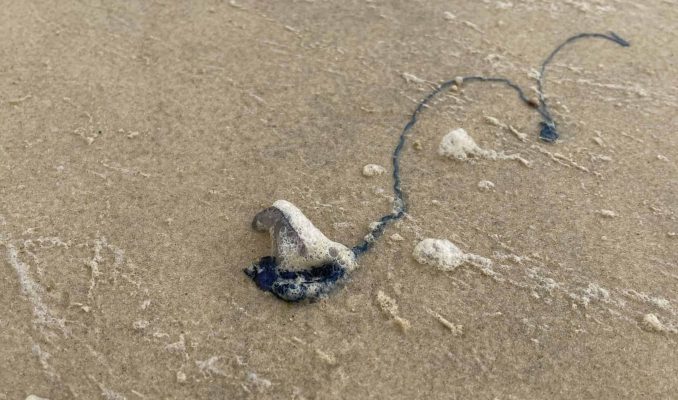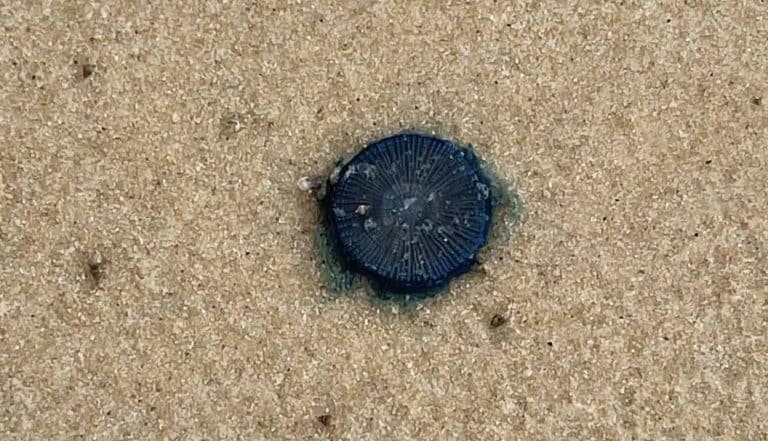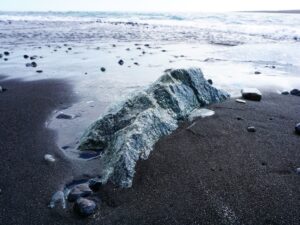
Bluebottle Jellyfish: How to Spot Them, What to Do If You’re Stung, and More
We’re reader-supported. When you buy through links on our site, we may earn an affiliate commission.

The Bluebottle jellyfish, Physalia utriculus, is a common, if unwelcome summer visitor to our beaches.
What is a Bluebottle jellyfish?
Bluebottles are not really a jellyfish but a siphonophore. A Siphonophore is a colony of tiny specialized polyps working together. They belong to the genus Physalia. They are also sometimes called Portuguese Man of War jellyfish. They can grow up to 45 cm in length and they typically have a blue or purple or clear colouration.
Do Bluebottle jellyfish sting?
Yes, Bluebottles can sting. Their tentacles are covered in tiny stinging cells called nematocysts. When these cells are activated, they release a venom that can cause pain, swelling, and itching. In some cases, Bluebottle stings can also lead to more serious symptoms like chest pain or shortness of breath.
A sting from a bluebottle usually causes immediate sharp pain and can inflame the skin in the immediate area. There may be welts and the skin can be very red. The pain is worsened if the tentacles rubbed or itched. The intense pain may last from minutes to many hours. Sometimes it can be followed by a dull ache involving the joints.
How do you treat a Bluebottle jellyfish sting?
If you are stung by a Bluebottle, the best thing to do is remove any tentacles from your skin and rinse the area with seawater.
Follow these steps to manage the pain and reduce the reaction.
First Aid tips for bluebottle stings:
Although most Bluebottle stings are not serious, they can still cause a lot of pain. In some cases, people can have an allergic reaction to the venom and experience more serious symptoms.
If the symptoms persist or get worse, seek medical attention.
- Remove the tentacles with gloves
- Take a seat, walking around may make the venom spread.
- Don’t rub or itch the area. This will just spread the venom.
- Rinse the area with sea water
- Immerse the affected area in hot water (42 – 45 degrees). Make the water as hot as the patient can tollerate. Keep the area immersed in the hot water for 30 – 90 minutes.
- Icepack to reduce swelling
- Pain relief. Take paracetamol or ibruprofen.
Hot water immersion for bluebottle stings
Hot water immersion should be applied as soon as possible after stinging for an effective treatment.
Hot water (or heat pack) is proposed to work in one of two ways: via deactivation of heat labile proteins in the venom, and via modulation of pain receptors
Apply hot, but not scalding, water (ideally at 42–45°C), or a heat pack for 30–90 minutes or until the pain eases. This can be done via:
- hot shower (which has the advantage of being able to vary the temperature)
- basin, bucket or bath filled with hot water
- heat packs.
Dos and Don’ts
Don’t use vinegar – it will make the venom spread
Don’t use alcohol – it will make the venom spread
Do take pain relief medication like ibuprofen or paracetamol.
Do use ice or a cold pack to help reduce swelling
Do seek medical attention if you experience chest pain, shortness of breath, or any other serious symptoms.
When are Bluebottles most likely to sting?
Bluebottles typically sting when they come into contact with skin, so people are most at risk of being stung when they are in the water.
What should you do if you see a Bluebottle jellyfish?
If you see a bluebottle jellyfish, stay calm and avoid contact with it.
How can you avoid getting stung by a Bluebottle?
The best way to avoid getting stung by a Bluebottle is to be aware of their presence and stay away from them. You can also wear protective clothing like a wetsuit or sting suit if you’re going swimming in areas where they are likely to be found.
When and where are Bluebottle jellyfish most common?
Blue bottle jellyfish can be found in coastal waters around the world. They typically prefer warm, tropical climates, but they can also be found in more temperate areas. They are most commonly seen near the surface of the water, but they can also drift down to lower levels.
In Australia, Blue bottles can be found all year round, but they are most common from November to March. They typically occur in coastal waters from Sydney to Cairns.
In the United States, they can be found along the Pacific and Atlantic coasts. They typically occur in coastal waters from California to North Carolina.
Portuguese Man of war jellyfish can also wash up on shore and they are often found washed up on the high tide.
How to identify a Bluebottle Jellyfish?
- They are blue or purple
- can grow up to 45 cm in length.
- Their tentacles are covered in tiny stinging cells called nematocysts.
- They typically occur near the surface of the water.
- May be found washed up on shore at high tide
- Blue bubble on the top of the jellyfish
Blue Button Jellyfish
The Blue button jellyfish is related to the Bluebottle jellyfish. It is a small jellyfish that typically grows to about the size of a golf ball. It has a blue or purple coloration and it can be found in coastal waters around the world.

The Blue button jellyfish does not have any tentacles, but it does have stinging cells called nematocysts. When these cells are activated, they release a venom that can cause pain, swelling, and itching. In some cases, Blue button jellyfish stings can also lead to more serious symptoms like chest pain or shortness of breath.
Blue Bottle FAQs
The bluebottle jellyfish (also known as the Portuguese man-of-war) is a venomous marine creature that can be dangerous to humans if they are stung by its tentacles. The venom in the tentacles can cause a painful sting that can result in symptoms such as skin irritation, nausea, vomiting, and difficulty breathing. In severe cases, a bluebottle jellyfish sting can lead to an allergic reaction or even death. It is important to avoid contact with bluebottle jellyfish and to seek medical attention if you are stung by one.
It is not recommended to touch a bluebottle jellyfish, as the tentacles of the jellyfish contain venom that can be harmful to humans. If you do come into contact with the tentacles, it is important to gently remove them from your skin using tweezers or another tool, and then rinse the affected area with salt water to help neutralize the venom. You should then seek medical attention if you experience any symptoms such as skin irritation, nausea, vomiting, or difficulty breathing. It is also important to avoid touching a bluebottle jellyfish if you have any open wounds or cuts, as the venom can more easily enter your body through these openings.
Found in tropical and subtropical waters around the world, including the Atlantic, Pacific, and Indian Oceans. They are most commonly found in the waters off the coasts of Australia, Brazil, and the southeastern United States. Bluebottle jellyfish are typically found in surface waters, where they float on the top of the ocean and are carried by the wind and currents. They are most commonly found in areas with warm, stable surface water temperatures and in areas where there is a lot of plankton for them to feed on.
We hope this blog post has been helpful! If you have any questions, please don’t hesitate to ask. And be sure to stay safe at the beach this summer! Speaking of safety, it’s important to remember to always swim near a lifeguard and to keep an eye on the weather forecast. And when you’re not in the water, don’t forget the sunscreen! Also, if you’re looking for some fun spring picnic ideas, be sure to check out our next blog post for some delicious and easy recipes to enjoy outdoors. Happy summer!

About Adventurerz
We absolutely love adventuring, camping and travelling! This Blog is for anyone who shares the same passion as us. We regularly upload pics and reviews of our new finds and adventurez, so come back regularly to see what is new!
Disclosure: I may receive affiliate compensation for some of the links below at no cost to you if you decide to purchase a paid plan. You can read our affiliate disclosure in our privacy policy. This site is not intending to provide financial advice. This is for entertainment only.



